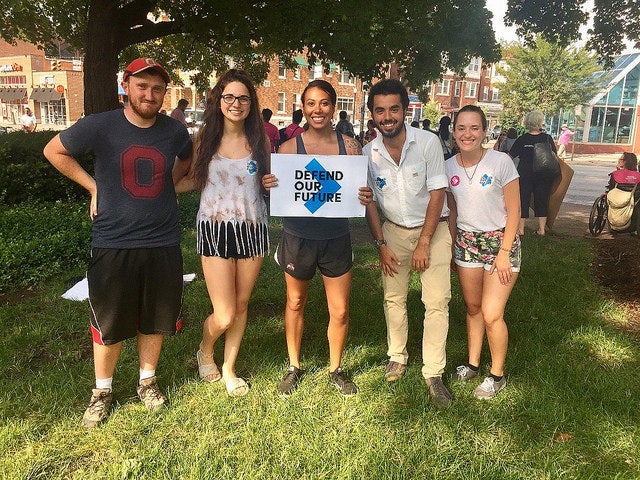Sustainability in International Sporting Events
Every two years, tens of millions of fans around the world travel and tune in to watch our countries compete on the premier soccer stage. There are few other events that capture the attention of the entire planet, which makes the World Cup a perfect stage for FIFA, host nations and fans to model sustainable choices and encourage climate action.

FILE – In this July 7, 2019, file photo, the United States players hold the trophy as they celebrate winning the Women’s World Cup final soccer match against The Netherlands at the Stade de Lyon in Decines, outside Lyon, France. The 2023 Women’s World Cup will be spread across nine cities in Australia and New Zealand. (AP Photo/Francisco Seco, File)
Global Commitments
Since 2016, FIFA has been a member of the UN Sports for Climate Action Framework promising to work toward two goals:
- Achieving a clear trajectory for the global sports community to combat climate change through commitments and partnerships according to verified standards, including measuring, reducing and reporting greenhouse gas emissions, in line with the commitments in the Paris Agreement; and
- Using sports as a unifying tool to federate and create solidarity among global citizens for climate action.
 Implementation
Implementation
For the 2023 Women’s World Cup, FIFA worked with host nations Australia and New Zealand to develop a plan that supported the climate goals of both FIFA and the host nations.
The carbon footprint of new infrastructure is significant for major global sporting events like the World Cup or Olympics. To avoid those climate impacts and costs, FIFA and the host nations used 10 existing stadiums and achieved green building certifications in new and old infrastructure. The stadiums also collaborated with local organizations for stadium services, including partnering with a local church to separate waste and compostable materials from onsite trash bins to reduce waste.
Looking forward
There were successes at the 2023 tournament, but there is still a long way to go until sporting events are in line with global climate goals and local environmental needs. The 2026 Men’s World Cup will be held in Canada, the United States and Mexico. Already, FIFA has initiated environmental workshops with host cities and stadiums focusing on their sustainability plans. Just as FIFA worked within the context of Australia and New Zealand, 2026 organizers should look to use ready-made climate tools these countries already have, like the IRS tool on energy efficient commercial buildings, to ensure the tournament is as environmentally-responsible as possible. And to make the greatest and most lasting impact, FIFA and host nations must focus on community and fan engagement.

Community Engagement

Globally, soccer is a community-centered sport. Many professional clubs are community-owned, and the sport has a long history of deep engagement and investment by fans. One example of this tradition, and how it can be used to spur climate action, is Bohemian Football Club. Sean McCabe is the Dublin team’s first chief climate justice officer and his job is to mobilize the club’s fans to take action on climate change.
I recently spoke with Sean about how he works with fans and the club to build environmental movements, grounded in working directly with the local community. Sean first worked on an app for fans that illustrated the history of the club and surrounding community, enticing people with soccer and then showcasing local climate action, saying “sports give [the club] access to people who want to take collective action.”
Building Authentic Advocacy
Fans can tell when their favorite sports team does not actually care about their causes. We are encouraged that FIFA, soccer clubs, host stadiums and cities are beginning to engage local communities, fan organizations and businesses to create climate action engagement plans. Each city is different: What works in Los Angeles may not work in Houston or Mexico City. Every few years the world comes together to cheer on their national team, FIFA has an incredible opportunity to uplift climate action on a global scale by anchoring the work in the communities their fans call home.


